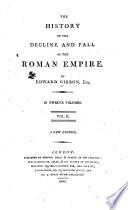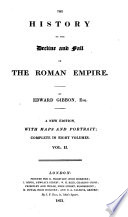 | Edward Gibbon - 1806 - 530 pages
...either to delay the death, to celebrate the triumph, or to discover the relics, of those canonized saints who suffered for the name of Christ. But I cannot determine what * A few days before his death, he published a very ample edict of toleration, in which he imputes ajl... | |
 | Edward Gibbon - 1821 - 520 pages
...either to delay the death, to celebrate the triumph, or to discover the relics, of those canonized saints who suffered for the name of Christ. But I...has suppressed all that could tend to the disgrace, t See Eusehius, lib. 8. c. 14. lib. 9. c. 2—8. Lactantins de MP c. 36. These writers agree in representing... | |
 | Plutarchus - 1828 - 286 pages
...ycleped) the New Testa-ment. Gibbon says of our grand historian : "Eusebius indirectly confesses that be has related whatever might redound to the glory, and...suppressed all that could tend to the disgrace, of religion." (Decl. and Fall, ch. 16 ; vol. 2, p. 49o) After speaking of the Christian who first endeavoured... | |
 | George Wilson Bridges - 1828 - 530 pages
...adopt the unpopular expedient of a dissolution. From the work of a credulous or crafty enthusiast, I cannot determine what I ought to transcribe, till I am satisfied how much I ought to believe ; nor is it a pleasing task to winnow out the few grains of truth which are contained in a mass of... | |
 | Robert Taylor - 1829 - 466 pages
...never existed. 3. That Eusebius himself indirectly confesses that he has acted on this principle, " that he has related whatever might redound to the glory, and that he has suppressed * Ensb. Eccl.Hist., lib. ir. c. 22. all that could tend to the disgrace of religion."* And that " if... | |
 | Robert Taylor - 1834 - 460 pages
...never existed. 3. That Eusebius himself indirectly confesses that he has acted on this principle, " that he has related whatever might redound to the...suppressed all that could tend to the disgrace of religion." * And that "if we subtract falsifications, interpolations and evident improbabilities, his... | |
 | Francis Jenks, James Walker, Francis William Pitt Greenwood, William Ware - 1835 - 422 pages
...determine what I ought to transcribe, till I am satisfied how much I ought to believe. The gravest of ecclesiastical historians, Eusebius himself, indirectly...to the glory, and that he has suppressed all that would tend to the disgrace of religion. Such an acknowledgment will naturally excite a suspicion, that... | |
 | 1835 - 424 pages
...remarks. Speaking of the sufferings of the martyrs during the persecution under Diocletian, he says, " But I cannot determine * what I ought to transcribe,...satisfied how much I ought to believe. The gravest of ecclesiastical historians, Eusebius himself, indirectly confesses, that he has related whatever might... | |
 | Edward Gibbon - 1837 - 1304 pages
...body. These melancholy scenes might be enlivened by a crowd of visions and miracles destined cither to delay the death, to celebrate the triumph, or to...suppressed all that could tend to the disgrace, of religion. '78 Such an acknowledgment will naturally excite a suspicion that a writer who has so openly... | |
 | Edward Gibbon - 1840 - 564 pages
...judges and governors, who had misunderstood bis intention*. Bee Uie edict in Eusebius, I. ix. c. 10. But I cannot determine what I ought to transcribe,...suppressed all that could tend to the disgrace, of religion.* Sueh an acknowledgment will naturally excite a suspicion that a writer who has so openly... | |
| |